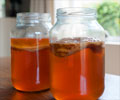Evidence shows that probiotics – bacteria like lactobacillus, often added to foods to boost health – can protect against infections.The latest study
Evidence shows that probiotics – bacteria like lactobacillus, often added to foods to boost health – can protect against infections.The latest study in the field shows children fed milk boosted with probiotic bacteria suffer fewer respiratory infections and require less antibiotic treatments.
Probiotics are live bacteria that colonise the gut and are presumed to promote healing by changing the balance of healthy and unhealthy bacteria. They also act to boost immunity. They are present, either naturally or added, in certain foods as well as being also sold in tablet form as dietary supplements.Now a Finnish study has tested the efficacy of a particular strain of probiotic, lactobacillus GG, in preventing childhood diarrhoea and respiratory infections.Lactobacillus GG is already known to reduce the duration of acute diarrhoea in children, but there have been few studies into its possible preventive effects.
The latest study in the British Medical Journal is the first to examine long-term effects in normal healthy children. The researchers monitored 571 children attending day care centres in Helsinki, Finland over a seven month winter period. The children were fed milk with or without Lactobacillus GG three times a day. The team found there was no difference in the number of days spent with diarrhoeal or respiratory symptoms.
But the children given the probiotic had less severe disease – that is, they had fewer absent days, fewer complications of colds such as middle ear infections, and required less antibiotic treatment.











